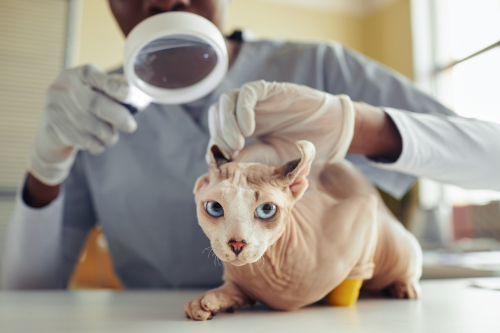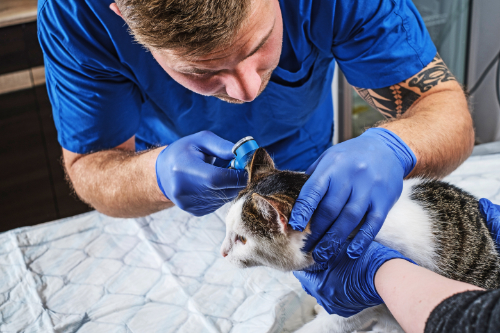Introduction
Cats are known for their fastidious grooming habits, but sometimes even their best efforts can’t prevent the discomfort when a cat has itchy ears. Itchy ears are a common issue among cats, and can be caused by a variety of factors such as ear mites, allergies, infections, and foreign objects. As a cat owner, it’s important to be able to identify the symptoms of itchy ears and know how to help your cat find relief. In this article, we’ll provide advice and tips for cat owners on how to help their cats with itchy ears.

Causes of itchy ears in cats
If a cat has itchy ears it can have various underlying causes, including:
Ear mites: Tiny parasites that cause intense itching and inflammation in the ears. They are highly contagious and spread easily among cats.
Allergies: Cats develop allergies to various substances, such as pollen, dust mites, or certain foods. Allergies cause itching and inflammation not only in the ears but also in other parts of the body.
Infections: Bacterial or yeast infections cause itchy, inflamed ears. These ear infections are caused by factors such as water in the ear canal, trauma, or a weakened immune system.
Foreign objects: Sometimes, foreign objects like grass, plant material, or even insects become lodged in a cat’s ear, causing irritation and itchiness.
If your cat is exhibiting symptoms of itchy ears, it’s important to identify the underlying cause in order to provide the appropriate treatment. Signs that cat’s with itchy ears have include scratching at the ears, shaking the head, redness or inflammation around the ears, and discharge from the ears.
Symptoms you see if your cat has itchy ears
Itchy ears in cats can cause a range of uncomfortable symptoms that can be distressing for both cats and their owners. Common symptoms of itchy ears in cats include:
- Scratching or rubbing the ears with the paws or against surfaces
- Shaking the head frequently
- Hair loss or scabs around the ears
- Redness or inflammation in and around the ears
- Discharge or foul odor from the ears
- Excessive ear wax or debris in the ears
- Loss of balance or disorientation (in severe cases)
These symptoms can help cat owners identify what the cause is if their cat has itchy ears, but it’s important to note that some cats may not show any obvious symptoms until the condition becomes severe. Regular ear checks and veterinary exams can help catch any ear issues early and prevent complications.

How to help your cat with itchy ears
There are several things cat owners can do to help their feline friends with itchy ears. Here are some tips and advice:
First look in the ear canal:
Do you see a foreign body like a peace of grass? Is there any discharge? Do the ears feel warmer than normal? Do they look a bit red? If you see a foreign body, it needs to be removed. If the discharge is white, yellow or green it probably is an ear infection. Do you see a lot of dark-brown ear wax? In that case ear-mites are the probable cause why your cat has itchy ears.
Clean the ears:
Use a gentle ear cleaning solution and follow the instructions carefully. Avoid using cotton swabs or anything that could damage the ear canal. Remove the most part of any discharge or ear-wax. Be careful not to rub too hard against the wall of the ear canal. The skin is already damaged there and this easily gets worse. The most part of the dirt must be removed so the ear-treatment can do a better job, but the ear-canal doesn’t have to be completely clean.
Use ear drops in case of ear-infections:
Over-the-counter ear drops or solutions can help soothe and treat the ears if your cat has itchy ears. However, it’s important to use products specifically designed for cats and to follow the instructions carefully. Use these drops twice a day for at least 5 days. 7 days is even better. The itch should be gone in about 2 or 3 days. The eardrops below will stop bacterial and yeast growth, and will help the skin inside the ear to heal.
Ear-mite treatement:
Do you see a lot of darkbrown, kind of grainy ear-wax in the ear? In that case the problem why your cat has itchy ears, is probably caused by ear-mites. You should use the following ear-drops to get rid of those little itchy insects. Use it once a day for 7 days, then stop for 7 days. Then use it again for 7 days. After that the problem should be over. Don’t forget to treat all the dogs and cats that live in close contact with your cat!
Manage allergies:
Allergies can cause itchy and inflamed ears in cats. After treatment of ear infections the ear problems keep coming back. Most of the time other parts of the body are itching as well. Identify and eliminate any potential allergens in your cat’s environment, such as certain food ingredients, cleaning products, or even pollen. Use the following two test-kits to identify what is bothering your cat. With the results you can try to avoid the allergens that are causing te problem. Don’t underestimate how often an ear infection is caused by an allergy!
Seek veterinary care:
If your cat has severe or persistent itchy ears, it’s important to seek veterinary care. Your veterinarian performs a thorough ear examination and recommend appropriate treatment, which may include prescription ear drops, antibiotics, or other medications.
By following these tips and seeking veterinary care when necessary, cat owners can help their furry friends find relief from itchy ears and prevent further complications.

Conclusion
When a cat has Itchy ears it is a common problem among cats. But there are many things that cat owners can do to help their furry friends find relief. In this article, we discussed the various causes and symptoms of itchy ears in cats, as well as tips and advice for treating and preventing this issue.
Remember, it’s important to identify the underlying cause of your cat’s itchy ears and seek veterinary care if necessary. With regular ear cleaning, appropriate use of ear drops, management of allergies, and professional veterinary care, cat owners can help their feline friends stay healthy and comfortable.
If you notice your cat has itchy ears or any other unusual symptoms, don’t hesitate to contact your veterinarian for guidance and support. With the right care and attention, you can help your cat live a happy and healthy life.





